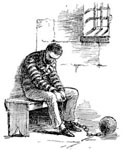
Prisoner of Love
AN INTERVIEW WITH A PARDONED PRO-LIFER
“He is a prisoner for me, and I am a prisoner for Him!” — St. Elizabeth of the Trinity
In October 2020 multiple pro-life rescuers staged an old-school sit-in at Washington Surgi-Clinic, a notorious abortion facility in Washington, D.C., run by Cesare Santangelo, who was known to perform late-term abortions. Some rescuers chained themselves to the furniture in an attempt to block the door, some prayed in the hallway, and some roamed around trying to talk to patients or staff. None of the rescuers was charged with a state crime for their sit-in that month, but in February 2022 several were hit with federal indictments, courtesy of Joe Biden’s Department of Justice, and faced up to 11 years in prison and $300,000 in fines. In May 2024 they were sentenced to prison terms of various lengths plus strict probation upon release. But then, in January 2025, Donald Trump issued a sweeping pardon, freeing all unjustly convicted pro-lifers, some of whom had been languishing in prison for almost two years. One of those pro-lifers was William Goodman.
Now free, Goodman plans to continue advocating for the unborn in a peaceful, prayerful manner. To learn more about his experience of political persecution for his faith and opposition to abortion, I interviewed him shortly after his release.
NOR: When you got to prison, how did other inmates react to the reason you were there?
William Goodman: By and large, they were shocked. They could not believe that I and the other rescuers were getting two to five years in federal prison for essentially doing a sit-in, handing out brochures in a hallway, livestreaming a sit-in, or planning a sit-in. They thought it was outrageous. A lot of the inmates had never heard of conspiracy against rights; most of them had never heard of FACE [the Freedom of Access to Clinic Entrances Act, signed by Bill Clinton in 1994 — Ed.].
A lot of the guys had personally experienced some of the injustices of federal conspiracy charges, so I think they could sympathize on a certain level. The inmates — and even some guards — showed us a lot of compassion.
Inmates in a federal prison are already critical of the Department of Justice and maybe angry at how the FBI raided them. They would say things like, “Well, I was dealing fentanyl, but you guys were just trying to save lives,” or “I was doing a big online financial scam, but you were just sitting in a chair.” Even people who were in favor of abortion said we shouldn’t have been getting this kind of mistreatment.
By and large, many of the people in prison, at least among the men, who were willing to say something often said they’re pro-life. There were exceptions, obviously, but almost everyone agreed that what we were going through was unjust.
You May Also Enjoy
He refers to God as Mother, encourages homosexual advocacy, denies the spiritual reality of Original Sin, and denies the necessity of the Cross for redemption.
Gosnell’s attorney asks why Gosnell should be convicted of murder in the case of “Baby A” but not in the cases of the countless other babies.
Conspicuously absent from a coalition of pro-life advocates supporting a personhood amendment in Mississippi were the bishops of Jackson and Biloxi.

